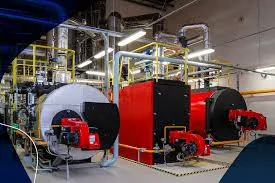
Nov . 24, 2024 03:54 Back to list
thermic fluid oil boiler
Understanding Thermic Fluid Oil Boilers
Thermic fluid oil boilers, commonly recognized for their efficiency and reliability, play a crucial role in various industrial applications. Utilizing thermal oil as a heat transfer medium, these boilers provide a versatile heating solution capable of reaching high temperatures without the pressure associated with traditional water-based boilers. This unique feature makes thermic fluid oil boilers highly sought after in sectors like chemical processing, food production, and plastic manufacturing.
One of the primary advantages of thermic fluid oil boilers is their ability to operate at elevated temperatures without the risk of steam formation. Conventional steam boilers operate under significant pressure, which poses safety risks and requires additional safety mechanisms. In contrast, thermic fluid boilers typically operate at atmospheric pressure, thus reducing the risks and operational costs associated with high-pressure systems.
The heating process in a thermic fluid oil boiler involves heating a special oil—thermal fluid—within a closed loop system
. This oil is then circulated through the heat exchangers or process equipment, delivering consistent and efficient heat to meet production requirements. The use of thermal oils allows for higher heat transfer efficiency compared to water, resulting in reduced energy consumption and lower operational costs.Another noteworthy characteristic of thermic fluid oil boilers is their temperature control capability. These systems are designed to maintain precise temperature control, which is vital for processes that require specific thermal conditions. This precision is achieved through advanced control systems that monitor and adjust the flow and temperature of the thermal oil, ensuring uniform heating and preventing overheating, which can damage equipment or alter product quality.
thermic fluid oil boiler

However, selecting the right thermal oil is essential for maximizing the efficiency and lifespan of the boiler. Thermal oils are formulated to withstand high temperatures without degrading, and they come in various grades depending on the specific temperature ranges and application needs. Proper selection of the thermal fluid, alongside regular maintenance and monitoring, can significantly enhance the overall performance of the boiler system.
Thermic fluid oil boilers also exhibit impressive energy recovery capabilities. Many modern systems are designed to minimize energy losses and recycle waste heat, contributing to overall energy efficiency. This capability not only promotes sustainability but also aligns with global trends towards reducing carbon footprints and operational costs. Industries that prioritize efficiency stand to benefit immensely from these advanced boiler systems.
In terms of installation and maintenance, thermic fluid oil boilers are generally more straightforward compares to traditional boilers. The absence of high-pressure components means there are fewer safety protocols and regulatory requirements to navigate. Nonetheless, routine inspections and maintenance are critical in ensuring operational reliability and preventing unforeseen breakdowns, which could result in costly downtimes.
Moreover, environmental considerations are gaining prominence in the manufacturing landscape. Thermic fluid oil boilers typically have a lower environmental impact compared to conventional systems. By optimizing energy use and minimizing emissions, these boilers contribute to a cleaner and more sustainable industrial environment.
In conclusion, thermic fluid oil boilers represent a significant advancement in industrial heating. Their ability to operate at high temperatures without pressure, coupled with precise temperature control and energy efficiency, makes them an ideal choice for various applications. As industries continue to evolve towards cleaner and more efficient technologies, thermic fluid oil boilers are poised to play an integral role in achieving these objectives. For manufacturers looking to improve their heating solutions, investing in a thermic fluid oil boiler may very well be a step towards enhanced productivity, cost-effectiveness, and environmental responsibility.
-
High-Efficiency Commercial Oil Fired Steam Boiler for Industry
NewsJul.30,2025
-
High-Efficiency Biomass Fired Thermal Oil Boiler Solutions
NewsJul.30,2025
-
High Efficiency Gas Fired Thermal Oil Boiler for Industrial Heating
NewsJul.29,2025
-
High-Efficiency Gas Fired Hot Water Boiler for Sale – Reliable & Affordable
NewsJul.29,2025
-
High Efficiency Biomass Fired Hot Water Boiler for Industrial and Commercial Use
NewsJul.29,2025
-
High-Efficiency Biomass Fired Hot Water Boiler for Industrial Use
NewsJul.28,2025
Related PRODUCTS






















